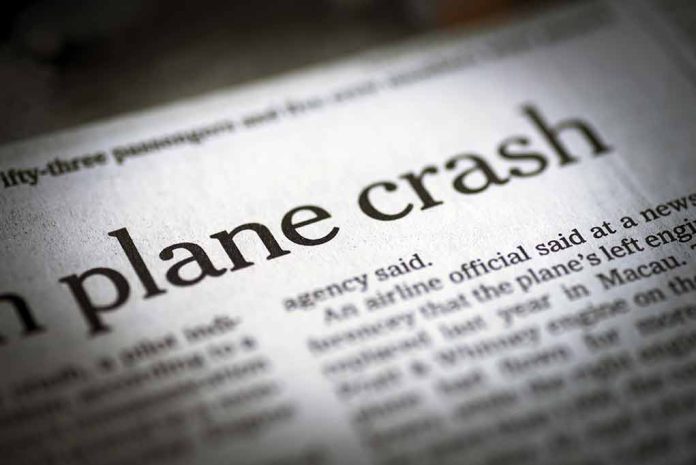
In a move that has outraged families of 346 crash victims, the Department of Justice may dismiss criminal fraud charges against Boeing for the deadly 737 MAX disasters, effectively allowing the aerospace giant to escape accountability for one of aviation’s most tragic corporate scandals.
Key Takeaways
- The Department of Justice is considering dropping criminal fraud charges against Boeing related to two 737 MAX crashes that killed 346 people in 2018 and 2019.
- Boeing allegedly misled FAA regulators about the MCAS system, which malfunctioned due to faulty single-sensor inputs causing both aircraft to dive uncontrollably.
- A previously negotiated $2.5 billion settlement from 2021 is being revisited after Boeing allegedly failed to implement promised safety reforms.
- Victims’ families have expressed outrage at the potential dismissal, with their attorney stating it would “dishonor the memories of 346 victims.”
- A trial is scheduled to begin on June 23 in Texas after a judge rejected an earlier plea deal that lacked transparency.
Boeing’s Potential Escape from Criminal Prosecution
The Department of Justice is considering a controversial “Non prosecution agreement” that would allow Boeing to avoid criminal fraud charges connected to the catastrophic crashes of Lion Air Flight 610 and Ethiopian Airlines Flight 302. These tragic incidents, occurring just five months apart in 2018 and 2019, claimed 346 lives and exposed serious flaws in Boeing’s aircraft design and corporate culture. Instead of facing trial, Boeing would pay additional fines, establish a compensation fund for victims’ families, improve compliance programs, and hire an independent consultant to oversee safety improvements.
The potential dismissal has generated intense backlash from families who lost loved ones in the crashes. These families have been fighting for justice and greater transparency about Boeing’s actions leading up to the disasters. The core of the charges involves allegations that Boeing deliberately misled the Federal Aviation Administration regarding the Maneuvering Characteristics Augmentation System (MCAS), a flight control software that played a central role in both crashes by forcing the aircraft into unrecoverable dives based on erroneous readings from a single sensor.
Boeing has agreed to plead guilty to a criminal fraud conspiracy charge and pay a fine of $243.6 million to resolve a US Justice Department investigation into two 737 MAX fatal crashes, the government said in a court filing https://t.co/5qK9Ffnxxm pic.twitter.com/2mhBtdhxD3
— Reuters (@Reuters) July 8, 2024
The Fatal Flaws of the MCAS System
The criminal charges against Boeing stem directly from its development and implementation of the MCAS system on the 737 MAX aircraft. When Boeing redesigned the 737 with larger engines placed further forward on the wings, it created a tendency for the aircraft’s nose to pitch upward during certain flight conditions. Rather than redesigning the airframe, Boeing created the MCAS software as a quick fix to automatically push the nose down when sensors indicated a potential stall condition. The fatal flaw was that this critical system relied on input from just one angle-of-attack sensor, creating a single point of failure.
“Dismissing the case would dishonor the memories of 346 victims,” said Paul Casell, attorney for the victims’ families.
More troublingly, investigators found that Boeing had removed information about MCAS from pilot training materials and flight manuals. This meant pilots were completely unaware of the system’s existence and had no understanding of how to counteract it when it malfunctioned. In both crash scenarios, the crews fought desperately against a system they didn’t know existed while their aircraft repeatedly forced itself into a fatal dive. The company’s alleged deception prevented proper FAA oversight and deprived pilots of critical safety information that could have saved lives.
A History of Failed Accountability
This isn’t the first time Boeing has attempted to escape full accountability for the MAX disasters. In 2021, the company reached a $2.5 billion settlement with the Justice Department that allowed it to avoid prosecution by agreeing to implement enhanced compliance and safety programs. However, in May 2024, prosecutors claimed Boeing had violated the terms of that settlement by failing to implement the promised reforms, which led to a new plea deal. That deal included a $243.6 million fine, $455 million for safety improvements, and oversight by an independent monitor.
U.S. District Judge Reed O’Connor dealt a blow to Boeing’s escape strategy when he rejected the new plea deal, siding with victims’ families who demanded a full trial. The judge was particularly critical of the selection process for the independent safety monitor and the exclusion of the court from that appointment process. This judicial intervention forced the case toward a trial scheduled to begin on June 23 in Texas, where the families expected to finally see Boeing held accountable for its actions. Now, with the DOJ considering dismissal, those hopes may be dashed.
The Fight for Justice Continues
The Department of Justice has indicated it will consider statements from the victims’ families before making a final decision on whether to proceed with the case dismissal. These families have consistently fought for greater transparency and accountability throughout the entire process, arguing that corporate profits were prioritized over passenger safety. Their voices will be crucial in the coming weeks as the DOJ weighs its decision. For many of these families, anything short of a full trial and guilty verdict would represent a failure of the justice system to hold powerful corporations accountable for deadly negligence.
The potential dismissal of charges against Boeing reflects a troubling pattern where large corporations can use their financial and legal resources to escape the most serious consequences of their actions. While Boeing has faced significant financial penalties and reputational damage, criminal accountability for the decisions that led to 346 deaths may remain elusive. As the June 23 trial date approaches, the families of those lost in the crashes continue their fight for justice against overwhelming odds, holding onto hope that the true story of corporate negligence will finally be told in court.



